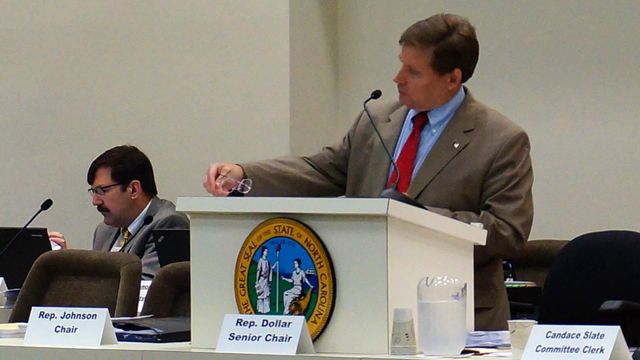House makes key changes to budget
In the course of a seven-hour debate Wednesday in their budget committee, House lawmakers agreed to some key changes to their spending plan, including a week of bonus leave for state workers.
Posted — UpdatedBut some of the changes the panel approved were substantive ones that will affect conference negotiations with Senate leaders. Many may not emerge in the final budget deal, but they will at least be on the table for debate.
Rep. Leo Daughtry, R-Johnston, head House budget writer for Justice and Public Safety, spoke against the move. He said the program is a "boutique" court that most counties manage without, while keeping the money in AOC would benefit the entire state.
"AOC is being treated like a rented mule," Daughtry said.
But other Republicans spoke out in favor of restoring the funding. Rep. John Szoka, R-Cumberland, said family courts help areas with large transient populations, including his, because they speed the processing of child custody and other family law cases.
"If we didn’t have this, we would be seeing three-, four-, five-year delays in some cases. I hate to see it coming out of AOC, but according to the rules, it has to come out of somewhere," Szoka said.
The Senate budget zeroes out the program. The House tried to fund it in 2013, but it wasn't in the final deal struck by the two chambers.
Iler said the $3 million would provide funding for 100 students a year to receive scholarships, which they then agree to pay back by teaching for four years.
"We want our best and brightest to go into teaching," he said. "I believe we need to stand up for the House and stand up for our position, put it in and see what happens."
Rep. Chuck McGrady, R-Henderson, was on the 2013 conference committee.
"We had to choose between Teaching Fellows and Teach for America," McGrady said, referring to another teacher recruitment program favored by Senate leaders. "I have a suspicion after conference we’re going to be right back where we were before. We don’t have a lot of funding here. Should we be funding both these programs that do essentially the same thing?"
But other Republicans argued for the change. Rep. Bryan Holloway, R-Stokes, said Teaching Fellows "does serve rural counties more. Teach for America, they don’t stay. After two or three years, they leave and go somewhere else and make more money. Teaching Fellows, they end up staying for 30 years."
Some Republicans spoke against the amendment, saying the sunset of the credit is part of the tax reform package passed in 2013. But many others, especially rural Republicans from eastern North Carolina, supported the credit's restoration. Rep. Michael Speciale, R-Carteret, talked about the role the credit has played in preserving historic buildings in New Bern.
Rep. Steve Ross, R-Alamance, said the credit is especially important to areas where deserted textile mills and factories would otherwise fall into dilapidated disrepair.
"We need some incentive for them to be revitalized," Ross said.
"We would be the only state in the Southeast without this credit," said Rep. Susan Martin, R-Wilson, "We need to keep looking at this piece."
The amendment, which makes some changes in qualifications for the credit, passed with overwhelming bipartisan support.
Gov. Pat McCrory has been pushing for the tax credit to be restored and hailed the amendment Wednesday evening.
"Historic preservation means jobs and economic development in small towns and large cities throughout North Carolina," McCrory said in a statement.
More amendments are expected Thursday during the House floor debate, scheduled to begin around noon. WRAL.com will carry a live video stream of the proceedings.
Related Topics
• Credits
Copyright 2024 by Capitol Broadcasting Company. All rights reserved. This material may not be published, broadcast, rewritten or redistributed.






